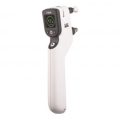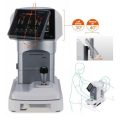-
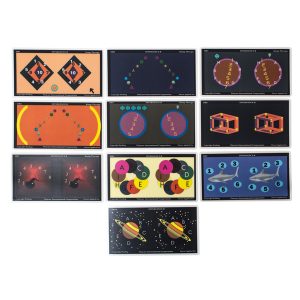 Morgenstern Color Fusion Cards - Divergence B Used with Bernell-O-Scope™ Builds large ranges of vergence (pull all the way in and out). Work in and out of instrument. Hold in space and fuse, diverge, move fused targets and also converge some. Made for "tromboning" work in the stereoscope as well as "pointing". Each card features eclectic designs and unique arrangements. Item #: SMDB
Morgenstern Color Fusion Cards - Divergence B Used with Bernell-O-Scope™ Builds large ranges of vergence (pull all the way in and out). Work in and out of instrument. Hold in space and fuse, diverge, move fused targets and also converge some. Made for "tromboning" work in the stereoscope as well as "pointing". Each card features eclectic designs and unique arrangements. Item #: SMDB -
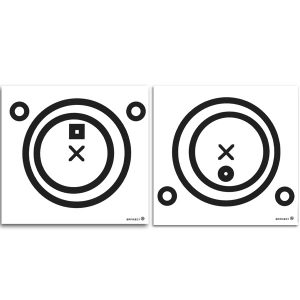
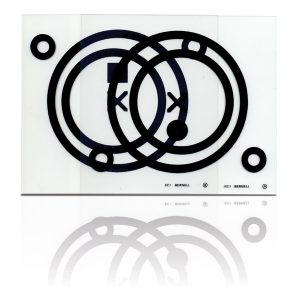 Free space fusion performed in a new, inexpensive way. Black target circles are printed on two 6" x 7" clear acetate cards. A unique, accurate method of developing increased fusional range without the need for costly lenses or filters.
Free space fusion performed in a new, inexpensive way. Black target circles are printed on two 6" x 7" clear acetate cards. A unique, accurate method of developing increased fusional range without the need for costly lenses or filters. -

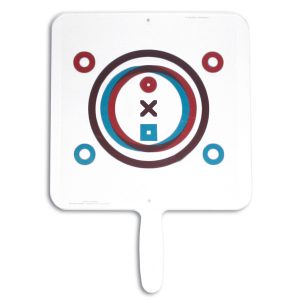 The new clear fixation paddle is 12" x 12" made of clear polycarbonate. Uses targets with cling material which adheres and removes easily from the front or back of the paddles by adhesion forces.
The new clear fixation paddle is 12" x 12" made of clear polycarbonate. Uses targets with cling material which adheres and removes easily from the front or back of the paddles by adhesion forces. -
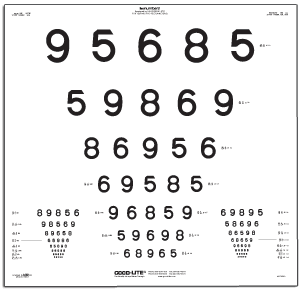 Adult LEA NUMBERS® chart for ETDRS Illuminated light boxes. Fits all existing ETDRS cabinets including both the ESV3000 and ESC2000. LEA NUMBERS® ETDRS chart contains optotypes in proportionally spaced (logMAR) lines; lines range from 20/200 to 20/8 (6/60 to 6/2.4) equivalent, 0.10 to 2.50. Fits in ESV3000 ETDRS illuminated cabinet.
Adult LEA NUMBERS® chart for ETDRS Illuminated light boxes. Fits all existing ETDRS cabinets including both the ESV3000 and ESC2000. LEA NUMBERS® ETDRS chart contains optotypes in proportionally spaced (logMAR) lines; lines range from 20/200 to 20/8 (6/60 to 6/2.4) equivalent, 0.10 to 2.50. Fits in ESV3000 ETDRS illuminated cabinet. -
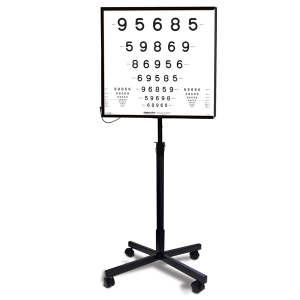 The ESC2000 Illuminator Cabinet provides a uniform retro-illuminated testing surface, ideal for clinical testing of high contrast and low contrast LogMAR tests, including ETDRS, Lea Symbols, Lea Numbers, Landolt C, etc. The cabinet utilizes a pure-white LED light source. (Stand not included. Can be purchased separately. Part # GL50004)
The ESC2000 Illuminator Cabinet provides a uniform retro-illuminated testing surface, ideal for clinical testing of high contrast and low contrast LogMAR tests, including ETDRS, Lea Symbols, Lea Numbers, Landolt C, etc. The cabinet utilizes a pure-white LED light source. (Stand not included. Can be purchased separately. Part # GL50004) -
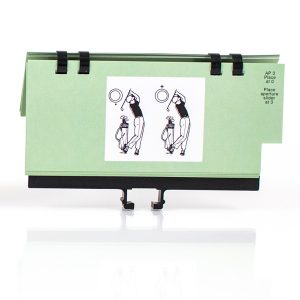
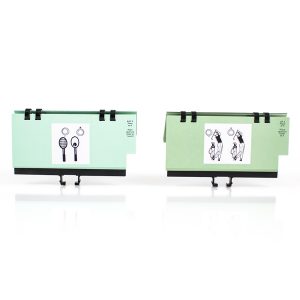 Extra Aperture Rule™ Cards Select either Bernstein Bears for pediatric use or Sports/Action targets. Techniques and target designs are developed for children and adult motivation.
Extra Aperture Rule™ Cards Select either Bernstein Bears for pediatric use or Sports/Action targets. Techniques and target designs are developed for children and adult motivation. -
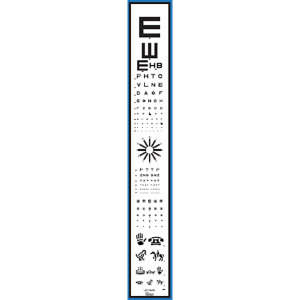 Designed for use in manual Chart Projectors including products from: R.H. Burton, Marco, Reichart, Topcon, and Woodlyn. Includes test for: → Tumbling E 20/400 – 20/200 (3 Lines) → Sloan Letters 20/100 – 20/10 (11 Lines) → Astigmatic Clock → Sloan Letters 20/50 – 20/10 (6 Lines) → Tumbling E 20/50 – 20/15 (5 Lines) → Allen Acuity 20/100 – 20/40 (4 Lines) Item #: VA1193
Designed for use in manual Chart Projectors including products from: R.H. Burton, Marco, Reichart, Topcon, and Woodlyn. Includes test for: → Tumbling E 20/400 – 20/200 (3 Lines) → Sloan Letters 20/100 – 20/10 (11 Lines) → Astigmatic Clock → Sloan Letters 20/50 – 20/10 (6 Lines) → Tumbling E 20/50 – 20/15 (5 Lines) → Allen Acuity 20/100 – 20/40 (4 Lines) Item #: VA1193 -
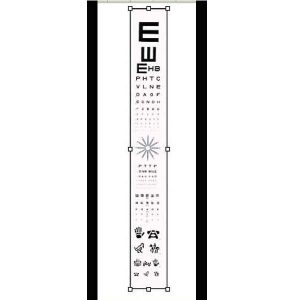 Projector Slide Replacements Family Practice Slide Letter Acuity, Astigmatic Clock, Tumbling "E", Allen Figures This family of projector slides are designed for testing all ages. Made of high quality photographic film, sealed between two pieces of glass to ensure sharp optotypes to maintain the integrity of your exam. Each slide must be adjusted for use on different length testing lanes.
Projector Slide Replacements Family Practice Slide Letter Acuity, Astigmatic Clock, Tumbling "E", Allen Figures This family of projector slides are designed for testing all ages. Made of high quality photographic film, sealed between two pieces of glass to ensure sharp optotypes to maintain the integrity of your exam. Each slide must be adjusted for use on different length testing lanes. -
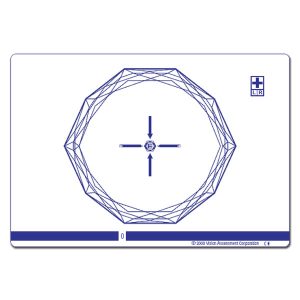 Gem Polarized Variable Vectographic with Fixation Disparity Target → Stereopsis depth of 700 seconds of arc → Includes Fixation Disparity target with central Fusion Lock → 16 diopter range for Base-In (Divergence) Training → 24 diopter range for Base-Out (Convergence) Training → Total accommodation range of 40 diopters → New improved Vecto Guides → Now includes Therapy Binder → Now includes doctor and patient instruction manuals → Now includes Patient Vision Therapy Record Form → Includes Standard Polarized Viewers Item #: VA1060PL
Gem Polarized Variable Vectographic with Fixation Disparity Target → Stereopsis depth of 700 seconds of arc → Includes Fixation Disparity target with central Fusion Lock → 16 diopter range for Base-In (Divergence) Training → 24 diopter range for Base-Out (Convergence) Training → Total accommodation range of 40 diopters → New improved Vecto Guides → Now includes Therapy Binder → Now includes doctor and patient instruction manuals → Now includes Patient Vision Therapy Record Form → Includes Standard Polarized Viewers Item #: VA1060PL -
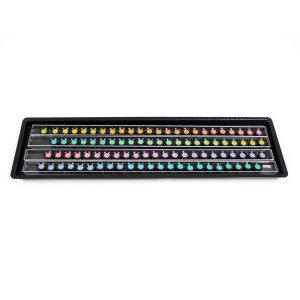 This handheld circular pupillometer device is used for measuring different size pupils. It was developed and researched by Dr. Jack Richman, O.D., as part of the Massachusetts Drug Evaluation and Classification Program (MDEP). This pupil measurement device is used by law enforcement officers across the country to assist in determining whether people are possibly impaired and/or under the influence of drugs. The reverse side has expected pupil size in different lighting conditions for non-impaired people. Item #: LV3553000
This handheld circular pupillometer device is used for measuring different size pupils. It was developed and researched by Dr. Jack Richman, O.D., as part of the Massachusetts Drug Evaluation and Classification Program (MDEP). This pupil measurement device is used by law enforcement officers across the country to assist in determining whether people are possibly impaired and/or under the influence of drugs. The reverse side has expected pupil size in different lighting conditions for non-impaired people. Item #: LV3553000 -
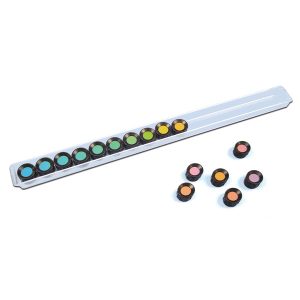 Farnsworth D15 Dichotomous Color Test Farnsworth Test for Congenital and Acquired color defects. The Farnsworth D-15 contains a reference disc holding notation 10 B 5 4 and fifteen numbered discs which make up an incomplete color circle. The patient arranges the discs and then evaluation of the patients arrangement separates 'normal' color perception from moderate and strong defects in deutan, protan or tritan axis color discrimination. The D-15 is housed in a plexiglass container. the disks are spread out on a table and arranged by the patient. The Farnsworth D-15 test is a subset of the well known Farnsworth 100 Hue Test. It is intended for classification instead of in-depth study of color vision defects. The D-15 and 100 hue tests are correlated. Growing Importance of Color deficiency Screening. In addition to congenital color deficiency screening there is growing evidence that adult acquired color deficiency, especially in yellow and blue perception, can indicate medical toxicity and other problems. Increasingly complex security and medical systems also require verification of all three types of color receptors. How the D-15 test works: The Farnsworth D15 is called 'dichotomous' because it is designed to separate subjects into one of two groups, 1) Strongly color deficient or 2) Mildly color deficient or color normal. This is accomplished by the arrangement of vivid (saturated) colored discs. A perfect score shows normal color perception. A non-perfect score is used to determine a medium or strong color deficiency.
Farnsworth D15 Dichotomous Color Test Farnsworth Test for Congenital and Acquired color defects. The Farnsworth D-15 contains a reference disc holding notation 10 B 5 4 and fifteen numbered discs which make up an incomplete color circle. The patient arranges the discs and then evaluation of the patients arrangement separates 'normal' color perception from moderate and strong defects in deutan, protan or tritan axis color discrimination. The D-15 is housed in a plexiglass container. the disks are spread out on a table and arranged by the patient. The Farnsworth D-15 test is a subset of the well known Farnsworth 100 Hue Test. It is intended for classification instead of in-depth study of color vision defects. The D-15 and 100 hue tests are correlated. Growing Importance of Color deficiency Screening. In addition to congenital color deficiency screening there is growing evidence that adult acquired color deficiency, especially in yellow and blue perception, can indicate medical toxicity and other problems. Increasingly complex security and medical systems also require verification of all three types of color receptors. How the D-15 test works: The Farnsworth D15 is called 'dichotomous' because it is designed to separate subjects into one of two groups, 1) Strongly color deficient or 2) Mildly color deficient or color normal. This is accomplished by the arrangement of vivid (saturated) colored discs. A perfect score shows normal color perception. A non-perfect score is used to determine a medium or strong color deficiency. -
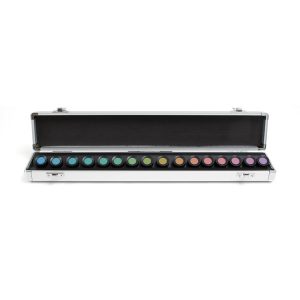 Farnsworth Test for Congenital and Acquired color defects. The Farnsworth D-15 contains a reference disc holding notation 10 B 5 4 and fifteen numbered discs which make up an incomplete color circle. The patient arranges the discs and then evaluation of the patients arrangement separates 'normal' color perception from moderate and strong defects in deutan, protan or tritan axis color discrimination. The disks are spread out on a table and arranged by the patient. The Farnsworth D-15 test is a subset of the well known Farnsworth 100 Hue Test. It is intended for classification instead of in-depth study of color vision defects. The D-15 and 100 hue tests are correlated. Growing Importance of Color deficiency Screening: In addition to congenital color deficiency screening there is growing evidence that adult acquired color deficiency, especially in yellow and blue perception, can indicate medical toxicity and other problems. Increasingly complex security and medical systems also require verification of all three types of color receptors. How the D-15 test works: The Farnsworth D15 is called 'dichotomous' because it is designed to separate subjects into one of two groups, 1) Strongly color deficient or 2) Mildly color deficient or color normal. This is accomplished by the arrangement of vivid (saturated) colored discs. A perfect score shows normal color perception. A non-perfect score is used to determine a medium or strong color deficiency.
Farnsworth Test for Congenital and Acquired color defects. The Farnsworth D-15 contains a reference disc holding notation 10 B 5 4 and fifteen numbered discs which make up an incomplete color circle. The patient arranges the discs and then evaluation of the patients arrangement separates 'normal' color perception from moderate and strong defects in deutan, protan or tritan axis color discrimination. The disks are spread out on a table and arranged by the patient. The Farnsworth D-15 test is a subset of the well known Farnsworth 100 Hue Test. It is intended for classification instead of in-depth study of color vision defects. The D-15 and 100 hue tests are correlated. Growing Importance of Color deficiency Screening: In addition to congenital color deficiency screening there is growing evidence that adult acquired color deficiency, especially in yellow and blue perception, can indicate medical toxicity and other problems. Increasingly complex security and medical systems also require verification of all three types of color receptors. How the D-15 test works: The Farnsworth D15 is called 'dichotomous' because it is designed to separate subjects into one of two groups, 1) Strongly color deficient or 2) Mildly color deficient or color normal. This is accomplished by the arrangement of vivid (saturated) colored discs. A perfect score shows normal color perception. A non-perfect score is used to determine a medium or strong color deficiency.

